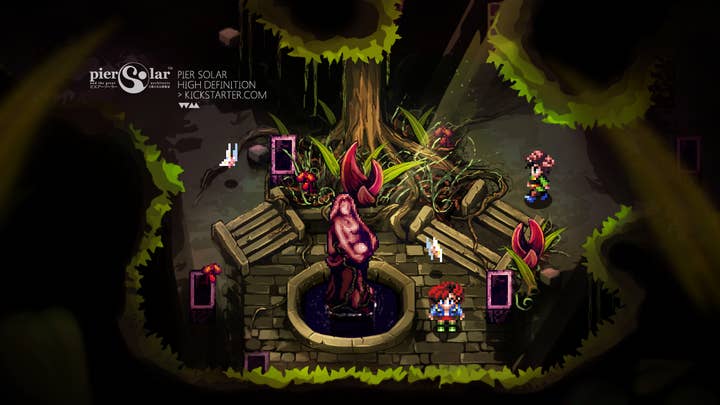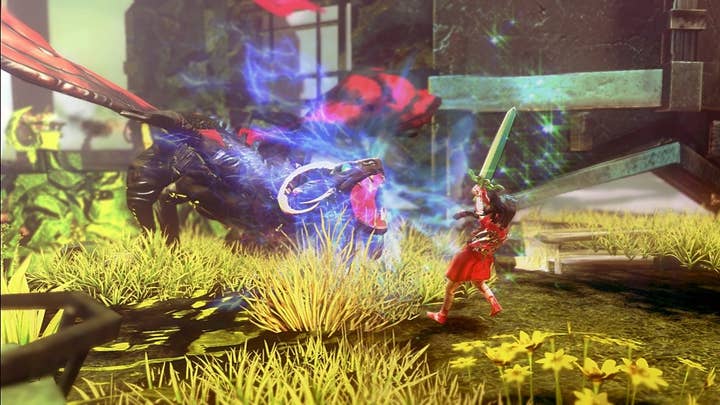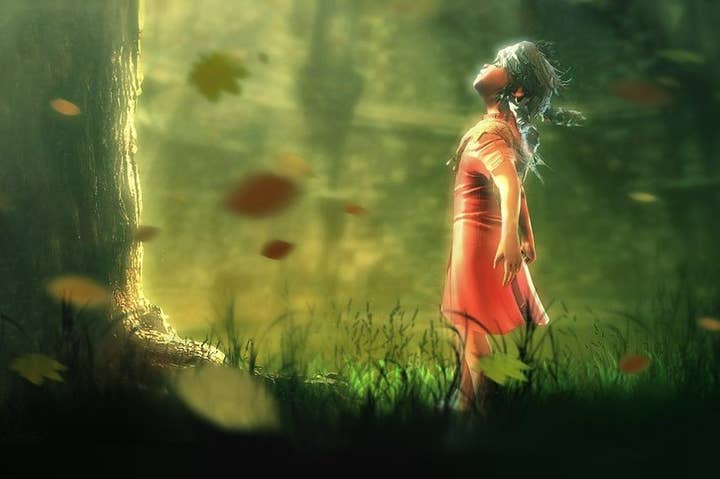Breaking Away: Brazil's indie developers are thinking globally
The industry sees Brazil as a marketplace, but its grassroots talent is hungry for wider recognition
In the priority it gives to the companies with the most reach and the most money, the Brazil Game Show is essentially the same as any event, anywhere in the world. The show-floor is carpeted by the same brash, neon-lit booths that fill the cacophonous halls of E3 and Gamescom, and they are paid for by roughly the same companies: Ubisoft, Activision, EA, PlayStation, Xbox, the usual suspects.
In part, this is indicative of the global nature of gaming, compelling evidence that a player in Brazil is excited by roughly the same products as one in Germany. But it also offers a perspective on where the Brazilian industry stands within that global picture. This is a country with no major games publisher - or a great deal of minor ones, for that matter - and the international companies at BGS are generally here for one unambiguous reason: to sell their products to the burgeoning consumer class of the fifth most populous country on Earth.
"There are studios with years of experience launching games in Brazil but they can't reach the outside. For them it feels impossible"
Devolver Digital
From the perspective of Brazil's growing independent development community, this annual visit from the global games business is generally one-way traffic. In my previous article, I talked to the small international publishers currently reaching out to Brazil's indies, and one comment from Devolver Digital's Andrew Parsons - excised from the final draft - stuck with me.
"There are studios with five, six, seven years of working in Brazil and launching games in Brazil, but they can't reach the outside," he said. "For them it feels impossible. They want to get outside, but the status they have in the industry in terms of game development is almost nil. For publishers in North America and Europe, it isn't very profitable to invest in money and marketing for a studio that doesn't have that proven record."
There are local independent developers at BGS, but not so many that talking to every single one couldn't be accomplished in a reasonably busy afternoon. And every single indie I met described the same ongoing sense of isolation from the wider industry, even as international attention on Brazil's consumer games market grows every single year. With no local publishers offering support, and with very little gaming knowledge among the country's angel and VC investors, breaking free from the cycle of work-for-hire, advergames and generally keeping the lights has been extremely difficult. Doing so with an original IP of real ambition - the holy grail for independent developers the world over - has been all but unthinkable.

"You need an entrepreneurial investor who is very, very excited about games, because that's the mindset that you need to work well with them," says Diego Leão, director at Gameblox Interactive, an indie based in the Brazilian state of Goiás.
"But there aren't many of them in Brazil. Gaming here started later than a place like the US, and investors are usually a lot older [than developers]. They just haven't had much contact with games. They didn't grow up playing them, and that's the biggest problem. Even if they want to fund your game, they might want to fund it in a way that would break it, or they wouldn't offer enough, or it would be too much and the game would have to grow bigger than is needed. We know what people want, but that's very difficult to get across."
The biggest project in Leão's career to date was a HD remake of Pier Solar, on which he collaborated with WaterMelon, the Iowa-based developer of the original game. It raised $230,000 through Kickstarter, secured coverage from some of the biggest websites in the games press, and generally received the sort of widespread attention that most Brazilian indies never experience.
"After years of failing making games, we realised that we have to be able to sell it eventually. It cannot be an afterthought"
Garage 227 Studios
Leão's next project is one of his own concepts: a self-referential platformer built around a very neat idea, one that anchors both its premise and its mechanics, while could also serve as a commercial hook for anyone with a fondness for gaming. The problem is getting it off the ground in the first place. This time Leão doesn't have a recognisable brand to leverage, or an American partner to help reach out to the English-speaking press and more plentiful sources of finance. Leão may well get to realise his ideal version of the game, but the journey will be harder, the road less forgiving.
For Daniel Monastero - one of three co-founders of the São Paulo-based Garage 227 Studios - the only reasonable way to deal with such challenging circumstances is to modify your approach. He maintains that the resources necessary to make high-quality original IP are available to Brazil's indie developers. The real problem is strategy: the wrong questions put to the wrong people.
Monastero's path to professional development has been circuitous, but his experience with game production stretches back to the late Nineties. Garage 227's debut project, Shiny, will be one of the first Brazilian independent games to be made with Unreal Engine 4. It is also a sincere attempt to leave those safe, unfulfilling work-for-hire jobs behind, to quit those teaching jobs and finally go full-time.
Like Ed Marques and Rafael Lima, his co-founders, Monastero is a pragmatist. He accepts that finding success as an independent developer is generally difficult, and not just in Brazil. Indies struggle in various ways all over the world, so the understanding that there will be no easy answers is built into the very fabric of the studio. Shortly after the formation of the company, when the trio had already selected Shiny from many prospective ideas, the team decided that the first six months of Garage 227's existence would be more about working on the company than working on the game. They met with lawyers and accountants and various friends from the games industry, and they came up with a plan.

"We also did some pre-production for Shiny," Monastero admits. "But we understood that just making the game isn't all that interesting for the people who have money. In that six months, we made sure we understood what an investor wants to see: where the money is going to be applied, and how, and when, and how much money they can take back from it. In Brazil, a lot of them won't care about the art. They won't care about the game. That six months helped us to understand the environment better.
"After years of failing making games, we realised that we have to be able to sell it eventually. It cannot be an afterthought... It's selling tires, man. Or screws. Or machines. It doesn't matter. Some indie developers think they must be artists, to only do it for themselves, and that if you get into the business of it you're not 'indie' any more. Well, 'indie' is just a label. That doesn't matter either.
"In Brazil, looking for funding is about getting connected to people outside of the games industry. That's the problem. If you're looking within the industry, you're looking to people who don't have any money, or to people who would rather just buy your game. Developers here are asking the same questions and expecting different answers."
Swordtales found a new answer for Toren, the most accomplished independent game I saw at BGS, and among the first to be made under Brazil's Rouanet Law. Also referred to as the Cultural Incentive Law, Rouanet was first introduced in 1991 as a way to stimulate the country's creative industries. It allowed Brazilian companies and individuals to use a certain percentage of their payable income tax as an investment in a cultural project - cinema, music, fine art, theatre, whatever, but not games, which have only covered since 2011.

"The games industry in Brazil was growing up too fast, and the government saw that and wanted to support it," says Vitor Severo Leães, the founder of Swordtales and Toren's producer. Leães believes that the addition of games to the Rouanet Law was an important step forward, if more than a little overdue. Having a project accepted doesn't make funding simple to find, exactly - like most legal matters in Brazil, it's a complex process - but it offers developers a legitimate and well understood context in which to approach a broader range of potential investors.
"Brazilian companies that usually support cultural projects don't understand the trends in games," Leães says. "It's a pioneer process. I believe it'll be easy in a couple of years, but today it's still hard to get that investment."
"Indie developers in Brazil want to close deals with publishers. It's a matter of survival"
Swordtales
But, in tandem with funding from a pre-existing investor, the Rouanet law has helped Swordtales achieve a noticeably higher standard of execution than virtually any other indie game at BGS. Not everything I saw seemed ready to duke it out with the flurry of games that hits Steam, Xbox and PlayStation every day, but Toren was a clear exception. Indeed, Swordtales now has a deal with Versus Evil, which released Stoic's The Banner Saga to no small amount of success and acclaim. For Swordtales, a deal like this is everything - an assurance that the fruits of its years and months of labour will register with the world, and not just Brazil.
"Indie developers in Brazil want to close deals with publishers. It's a matter of survival," says Leães. "In Europe or North America, being an independent [from publishers] is much more of an ideal, but in Brazil we don't have that choice. There's no opportunity to get jobs with big studios. There's no EA here. There's no Warner Bros. If you want to make games you have to go indie, and you have to find support. The feeling of isolation is real.
"I went to Gamescom, and I saw a lot of game developers networking there. It's so much easier when you're in Europe. Brazil is so far from the rest of the industry, and that's very difficult because we need to get there somehow."
Leães pauses for a moment. He looks over to the BGS booths, bedecked with giant screens showing the latest from Ubisoft, Activision, Take-Two, and the rest.
"The huge third parties, they're here to make money," he shrugs. "They want our customers, but maybe not our games."
This is the final article in a three-part series on the Brazilian games industry. The others can be found here and here

